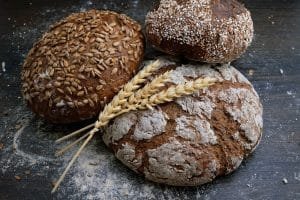Best Supplements for Bloating and Weight Loss Success

Wellness Fixation is reader supported, meaning I may earn a small commission if you purchase something through my links at no extra cost to you. Thanks for your support! Learn more
Ever felt like your belly’s blowing up like a balloon after a meal? Yeah, we’ve all been there. That uncomfortable bloating isn’t just an annoyance; it can actually play tug-of-war with your weight loss efforts. Best supplements for bloating and weight loss, how to lower cortisol? It’s the million-dollar question with answers as varied as our diets.
You know what I’m talking about: that battle of the bulge where you’re not only fighting stubborn body fat but also wrestling with gut goblins that leave you feeling more puffed than proud. We’re diving into this head-first, because let’s face it – no one wants to feel like they swallowed a beach ball.
I promise, stick around and by the end of this read, you’ll have pocketed some golden nuggets on how to deflate the bloat and tip the scales in your favor—no magic pills required, know the best supplements for bloating and weight loss.
Table of Contents:
- Unpacking Bloating: Causes and Connections to Weight Loss
- Digestive Enzymes: Catalysts for Relief and Weight Management
- Probiotics’ Dual Role in Gut Health and Slimming Down
- Peppermint Oil’s Efficacy Against IBS Symptoms Including Bloating
- Fiber Supplements Like Psyllium Husk Aid Digestion & Weight Control
- Ginger Root & Other Herbal Remedies Targeting Bloat & Excess Pounds
- Activated Charcoal’s Absorptive Qualities Minimizing Gas & Toxins
- FAQs in Relation to Best Supplements for Bloating and Weight Loss
- Conclusion
Unpacking Bloating: Causes and Connections to Weight Loss
Battling the bloat is like trying to solve a mystery where your stomach’s the main suspect. Let’s face it, bloating can be as unpredictable as weather forecasts, leaving you guessing if you’ll need an umbrella or shorts for the day ahead.
Identifying Common Culprits Behind Bloating
If you’ve ever felt more puffed up than a Thanksgiving Day parade balloon, overeating might be playing its part. Think of your belly as real estate; there’s only so much space. Overindulge at mealtime and your digestive tract becomes a cramped studio apartment in NYC during a heatwave – uncomfortable.
Now let’s talk food intolerances – these are like uninvited guests crashing your gut party. Lactose intolerance often leaves folks feeling gassy after saying cheese too many times. And then we have irritable bowel syndrome (IBS), acting all high-maintenance by demanding specific eating habits lest it causes mayhem.
Digestive disorders don’t just crash parties; they move in and refuse to leave—conditions such as cystic fibrosis or exocrine pancreatic insufficiency mess with enzyme replacement therapy, while ulcerative colitis plays hide-and-seek with comfort levels.
The Weight Loss Connection
Cutting through bloating isn’t just about vanity—it’s science about the best supplements for bloating and weight loss. Managing this puffiness can give weight loss efforts some serious wings because who doesn’t want their body working more efficiently? A less bloated system means better digestion and possibly even enhanced energy expenditure leading away from unwanted weight gain.
Clinical trials show that those enzymes, natural born food crushers, could help reduce gas-related symptoms linked to certain foods which makes them best supplements for gut health and weight loss strategy sidekick material.
And here comes physician’s choice advice: popping peppermint oil capsules may calm down IBS quicker than lavender on your pillow does before bedtime, or keep reading to learn the best supplements for bloating and weight loss.
Let me paint you a picture: imagine billions of little friendly bacteria setting up shop in our guts—this bacterial overgrowth actually helps keep things running smoothly rather than causing chaos.
Sure enough, evidence suggests probiotics make good tenants by promoting beneficial bacteria growth—and when they’re happy—they help alleviate gastrointestinal conditions causing that dreaded bloat—a win-win.
So next time you feel like someone pumped air into your tummy making button-popping fears all too real, remember that it’s a common issue. You’re not alone in this battle against bloating. Simple changes to your diet or daily routine often work wonders. Watch your diet, drink lots of fluids and be active; these measures can have a big impact. And if the problem persists, don’t hesitate to reach out for medical advice—it could be crucial.
Bloating can throw a wrench in your day, and it’s often caused by overeating or food intolerances. To deflate the situation, focus on diet tweaks and staying active. Consider enzymes for digestion help and probiotics to keep gut bacteria happy – they’re secret weapons against that tight-belly feeling.
Digestive Enzymes: Catalysts for Relief and Weight Management
Ever felt like a balloon after scarfing down your favorite meal? That’s bloating doing its unwelcome jig in your belly. But what if I told you that digestive enzymes could be the secret DJs turning off that bloat-beat?
Understanding How Digestive Enzymes Function
Picture this: Your body is a sophisticated food processor where digestive enzymes are the unsung kitchen staff, tirelessly breaking down those juicy steaks and heavenly pastries into tiny bits. These natural substances work overtime so nutrients can waltz right through your gut’s door.
Research tells us, without these enzymatic bouncers, proteins would loiter undigested causing all sorts of ruckus—think gas-related symphonies no one wants tickets to.
The Link Between Enzymes and Weight Loss
You’re not just imagining it; when digestion gets smoother thanks to our enzyme pals, weight management might tag along for the ride. See, proper breakdown means fewer traffic jams in Digestionville—and less chance of false alarms on the scale from trapped food passengers.
Better yet, studies show some enzymes reduce gas-related symptoms more effectively than placebo pills ever could. Talk about a breath of fresh air.
Selecting Probiotic Strains for Optimal Benefits
Moving onto probiotics—these friendly gut squatters throw block parties encouraging good vibes only. Choosing high-quality strains ensures maximum benefits; they’ll keep harmful bacteria at bay while easing up on gastrointestinal conditions leading to dreaded ballooning episodes.
I mean, who wouldn’t want an internal squad keeping things chill in Tummy Town?
Peppermint Oil’s Efficacy Against IBS Symptoms Including Bloating
If you’ve got irritable bowel syndrome (IBS) throwing fits inside you, peppermint oil might just be the zen master calming those tummy tempests with its soothing muscles magic touch.
In fact, clinical trials have proven this minty marvel tackles stomach pain and turns bloating blues into serenity—a real lifesaver when navigating life’s spicy moments. And there we have it folks—an inside scoop on how enlisting certain supplements could lead to feeling lighter both physically and metaphorically. With some
Chow down without the blow-up by harnessing digestive enzymes to break down food efficiently, potentially easing your weight loss journey. Keep gut parties healthy with probiotics and chill out IBS flares with peppermint oil’s soothing touch.
Probiotics’ Dual Role in Gut Health and Slimming Down
Talking about gut health can be as complex as a subway map, but here’s the scoop: probiotics are like your belly’s friendly commuters. They navigate through the digestive tract to make sure everything runs on time and without delays—meaning they help keep bloat at bay and support weight loss.
Selecting Probiotic Strains for Optimal Benefits
You wouldn’t grab just any old cup of coffee when you need that perfect morning pick-me-up, right? Similarly, picking high-quality strains of probiotics is crucial. Not all bacteria are created equal; some have been shown to reduce gastrointestinal conditions causing bloating better than others. Think of them as elite athletes in the world of beneficial bacteria—they’re specially trained to get your gut into tip-top shape.
For example, certain lactobacilli can show those pesky symptoms of irritable bowel syndrome (IBS) who’s boss by alleviating uncomfortable bloating. Imagine these microscopic powerhouses wearing tiny capes, swooping in to save the day—and your jeans from feeling too tight after lunch. Research suggests that introducing these specific strains could transform an unruly microbiome into a serene garden party where everyone gets along beautifully.
Bloating isn’t just annoying—it’s also sneakily sabotaging your efforts if shedding pounds is on your agenda. A well-balanced gut flora helps with food breakdown which may lead not only to less gas production but also enhanced energy expenditure—a fancy way of saying it helps burn calories more efficiently.
The catch? Just gulping down any bottle labeled “probiotic” won’t do much good unless it contains viable amounts capable enough to take root and flourish in their new home—the gutsy ecosystem within you. So before reaching for that supplement off the shelf, consult with a registered dietitian or physician who understands how these little critters work best for both improving digestion and supporting body fat reduction goals. Clinical trials confirm, selecting mighty microbe warriors is key; think quality over quantity every time.
And hey—since we’re chatting about this topic anyway—you might want a heads up on what else might ease bloat besides our bacterial buddies: consider enzyme supplements particularly helpful if you find dairy does somersaults in your stomach due to lactose intolerance. Or try pairing ginger tea with meals; it’s got natural properties that some folks believe aid digestion.
Probiotics are the belly’s friendly commuters, keeping things moving to reduce bloat and support weight loss. Choose high-quality strains for best results—think lactobacilli for IBS relief and a boost in calorie burning. But remember, it’s all about viable amounts; more isn’t always better.
Talk to an expert before picking a probiotic supplement and consider enzyme supplements or ginger tea as additional allies against bloating.
Peppermint Oil’s Efficacy Against IBS Symptoms Including Bloating
Battling the bloat when you have IBS can feel like trying to calm a storm in your belly. But here’s a breath of fresh air: peppermint oil supplements may just be your new best friend. These little capsules pack a punch, helping to soothe those unruly muscles in your GI tract.
The Soothing Power of Peppermint
If there was an Olympics for soothing digestive tracts, peppermint oil would take home the gold. Why? Because studies show that it effectively eases IBS symptoms, including that pesky stomach pain and bloating we all love to hate.
Sipping on peppermint tea might give some relief, but for full-on impact against those rebellious bowels, popping a peppermint oil supplement could help you go from feeling like an overinflated balloon to serene and flat-stomached.
A Chill Pill for Your Gut Muscles
You know how mint leaves you with that cool sensation? Imagine that calming vibe working its magic on your insides—because basically, it does. When ingested as part of a supplement regimen designed specifically for people wrestling with IBS symptoms,, this herbal hero gets right down into the trenches of the gastrointestinal battlefield.
This isn’t just folk wisdom; clinical trials back up these claims. A double-blind study found participants saw significant symptom reduction after using peppermint oil compared to their less lucky counterparts who got stuck with placebo (sorry guys). Now imagine not having to unbutton your jeans at every meal—that’s what we’re talking about.
Minty Fresh Relief without Side Effects?
Popping pills can sometimes make us worry about side effects worse than our original problem—but here comes another win for peppermints’ corner. It’s generally well-tolerated which means no needlessly adding “avoid medication side-effects” onto today’s list of worries—a list already long enough if we’re being honest.
If you’re struggling with IBS, peppermint oil could be the answer to your prayers; why not try it and see how this natural remedy can provide both immediate relief and long-term benefits? This natural remedy not only soothes your gut quickly but also works to foster ongoing tranquility in your digestive tract. Why not give it a shot and see how this herbal hero can help you feel better both now and down the road?
Peppermint oil supplements could be a game-changer for IBS sufferers. They’re like a chill pill for your gut, proven to knock out bloating and discomfort without nasty side effects.
Fiber Supplements Like Psyllium Husk Aid Digestion & Weight Control
When it comes to keeping our digestive system happy and weight in check, fiber supplements for digestion are the unsung heroes we often overlook. Think of them as your gut’s personal trainers—working behind the scenes to keep things moving smoothly.
Psyllium Husk: Your Gut’s Personal Trainer
Soluble fiber like psyllium husk doesn’t just waltz through your stomach; it pulls off a high-wire act. It bulks up and softens stool, making sure constipation relief is no circus trick but a regular performance. Systematic reviews suggest that with psyllium supplementation, folks dealing with IBS-related constipation noticed less abdominal discomfort—that’s some real bloat-busting power.
If you’re on a mission to shed some pounds, appetite control can feel like trying to tame a wild beast. But here’s where psyllium husk steps into the ring again. By expanding in your stomach and making you feel fuller longer, this mighty supplement could be an ally in managing body weight without waving any red capes at hunger pangs.
The Fiber Effect: More Than Just Regularity
We’ve all heard “fiber keeps you regular,” but let me tell ya—it does so much more than schedule bathroom breaks. Integrating soluble fiber from sources like psyllium into your healthy diet is about as good an idea as using GPS on road trips—you’ll get where you need to go without unnecessary pit stops or wrong turns (and by that I mean bloating or overeating).
In fact, recent findings show us that such fibers can do wonders not only for irritable bowel syndrome management but also play their part when paired with other lifestyle changes for shedding excess body fat.
To wrap up this section—not literally because there’s no wrapping involved with fiber—think of these dietary supplements as nature’s way of giving us back control over our eating habits and digestive issues. Remember though; they’re part of the band rather than solo artists. A well-rounded approach including exercise, plenty of water intake alongside these fibrous friends might just make bloated bellies and stubborn scales things of past gigs.
Fiber supplements like psyllium husk are your digestive system’s unsung heroes. They help you stay regular, fight bloating, and keep hunger at bay to aid weight loss. But remember, they’re best used as part of a full band—combine them with exercise and water for the greatest hits.
Ginger Root & Other Herbal Remedies Targeting Bloat & Excess Pounds
Ever felt like you’re carrying an inflated beach ball in your belly? Well, ginger root might just be the pin to pop that discomfort. This spicy rhizome has been strutting its stuff on the herbal runway for ages, flaunting anti-inflammatory properties that could calm gastrointestinal distress. But does it really help shed those extra pounds and deflate bloat?
The answer is a bit of a tease—while ginger certainly has health benefits up its sleeve, nailing down its direct impact on bloating requires more detective work. Some studies suggest ginger can play hardball with inflammation and even rev up digestion; others say “not so fast” because solid evidence isn’t as plentiful as we’d like.
But don’t toss out your ginger tea just yet. Let’s talk about how this fiery friend works in the tummy arena. When food seems to throw a wild party in your gut, causing all sorts of ruckus, including uncomfortable bloating, ginger may tell everyone to simmer down. It takes aim at inflammation and soothes muscles along your digestive tract—the very ones that can cramp up and make you feel like there’s no room left at the inn. Is one of the best supplements for bloating and weight loss ginger, keep reading to find out!
Other Botanicals Joining Ginger on Bloat Patrol
Diving into nature’s medicine cabinet uncovers other gems potentially geared toward easing bloat while tipping the scales in favor of weight loss. Picture peppermint oil—a minty superhero when it comes to irritable bowel syndrome (IBS). Studies show peppermint oil swooping in, relaxing those GI muscles which could mean less stomach pain and bloat for IBS warriors.
We’ve also got probiotics sitting pretty with their dual role as gut guardians and slimming agents—they’re not just good bacteria boosters but potential peacekeepers against battles within our bellies leading to puffiness.
Fiber supplements join this botanical brigade too—psyllium husk being one standout star playing both sides by helping things move smoothly through our inner highways (bye-bye constipation.) while keeping hunger pangs at bay—it’s like having a personal bodyguard against snack attacks.
Last but not least is activated charcoal—like having an absorbent sponge ready to soak up unwanted gas guests leaving us feeling lighter without unwanted toxins crashing our system’s party.
In short: Mother Nature packs some serious punch when it comes to combating both bloat. She furnishes us with numerous edibles and herbs that can assist in alleviating uneasiness and advancing digestive health. Incorporating these natural remedies into your diet might just be the key to feeling better. The best supplements for bloating and weight loss can also help.
Ginger root might be your belly’s best friend—calming inflammation and digestion drama. Other natural stars like peppermint oil, probiotics, fiber supplements, and activated charcoal are also ready to join the fight against bloat and help you feel lighter.
Activated Charcoal’s Absorptive Qualities Minimizing Gas & Toxins
Bloating got you feeling like a human balloon? Let’s talk about the dark horse of gut health—activated charcoal. Now, before you start picturing BBQ briquettes, let me clarify: we’re talking about activated charcoal capsules specifically designed to tackle your digestive woes.
When it comes to gas and toxins in your tummy, this stuff means business. Think of it as a bouncer at the club that is your digestive system; unwanted guests get shown the door swiftly. Activated charcoal doesn’t just absorb; it binds with gases and toxins like they owe it money—which might be why people experience such comfort after using these capsules.
But here’s where things get interesting: beyond just providing bloat relief, there’s chatter about how minimizing these gastric gatecrashers could also contribute to overall gut wellness. And since our guts are basically the CEO of body functions, keeping them happy can mean good news for everything from mood swings to immune health.
Selecting Quality Activated Charcoal Supplements
Finding top-notch activated charcoal is key—you want something more reliable than finding Wi-Fi in a cave. Look for products from reputable companies that specialize in supplements market high-quality ingredients (like NaturaLife Labs). Your stomach pain isn’t amateur hour so don’t settle for anything less than professional grade when choosing an enzyme supplement.
The buzz around this black powder peaked interest enough to inspire clinical trials looking into its effectiveness against uncomfortable bloating and abdominal discomfort related issues—kinda makes you think twice before passing up on those unassuming little capsules.
Tips For Best Results With Activated Charcoal
If you decide that swallowing what looks like remnants of last night’s campfire might help ease your gastrointestinal theatrics—it’s best used occasionally rather than daily—to avoid interfering with nutrient absorption or medication efficacy because yes, while great at reducing gas-induced swelling faster than deflating party balloons after midnight…it doesn’t discriminate between bad guys and good nutrients.
Timing is also crucial. Take activated charcoal separately from meals or medications by a couple hours because remember: even beneficial bacteria aren’t safe from its grasp—and we gotta keep those friendly microbes thriving.
All jokes aside though—if persistent bloating has become part of your daily plot twist—it may be worth discussing with a healthcare provider whether incorporating an occasional dose into your routine could offer some much-needed comic relief...
Activated charcoal acts like a bouncer for your gut, kicking out gas and toxins. It’s not just for show—clinical trials back up its belly-flattening claims. Just don’t make it an everyday thing to keep the good nutrients in and check with your doc if bloating is your daily drama.
FAQs in Relation to Best Supplements for Bloating and Weight Loss
What vitamins are best for bloating and weight loss?
Vitamin B6 and magnesium can ease water retention; probiotics may help gut health aiding in less bloat.
What is the fastest way to lose belly fat and bloating?
Cut carbs, amp up protein intake, and include fiber-rich veggies too. Hydrate well. Consistent exercise speeds it up.
What is the best anti-bloating supplement?
Digestive enzymes or peppermint oil capsules often work wonders against bloat. Probiotics are runners-up.
What supplement is good for reducing belly fat?
Fiber supplements like psyllium husk curb appetite, while green tea extract might boost metabolism rates.
Conclusion
So you’ve navigated the bloating battlefield, armed with knowledge on what causes that belly bloat and how it hampers weight loss. You’ve learned about digestive enzymes and their role in breaking down food more efficiently, which might just help shrink your waistline too.
You now know probiotics aren’t just good for gut health; they can also support a trimmer figure. And let’s not forget peppermint oil – nature’s way of easing those IBS blues away.
Fiber supplements like psyllium husk? Yeah, they’re in your corner for digestion and keeping hunger at bay. Ginger root has popped up as well, possibly helping soothe that tummy turmoil while inching you closer to weight goals.
Last but not least: activated charcoal could be pulling double duty by trapping gas and toxins. Remember this when scouting out the best supplements for bloating and weight loss success—it’s all about finding what gels with your gut.










